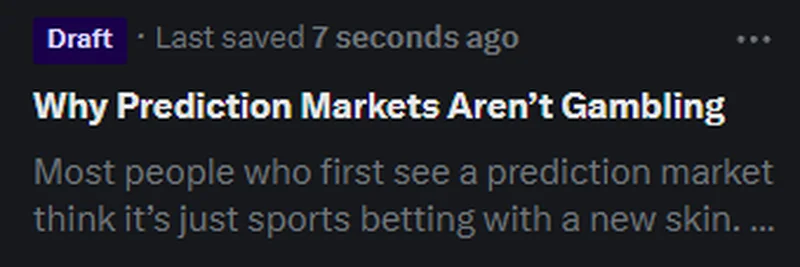In the ever-evolving world of crypto, where meme tokens can skyrocket on a whim or crash just as fast, distinguishing between pure gambling and smart speculation is key. That's why a recent teaser from PixOnChain, a well-known trend spotter in the blockchain space and advisor at Cerebro HQ (an AI-powered crypto portfolio manager), has the community buzzing. Posted on X, the tweet promises a "banger article" that tackles the age-old question: "ok but how is this not just sports betting lol?"
The teaser includes a sneak peek at the article's opening: "Most people who first see a prediction market think it's just sports betting with a new skin..." And PixOnChain claims this piece might "change how you look at the whole space." You can check out the original tweet here.
What Are Prediction Markets, Anyway?
For those new to the concept, prediction markets are decentralized platforms where users can buy and sell shares tied to the outcome of real-world events. Think of it like betting on whether a meme token will hit a certain market cap by year's end, or if a celebrity endorsement will pump a coin's price. Popular examples include Polymarket, built on blockchain tech, where the share price essentially represents the crowd's estimated probability of an event happening.
Unlike traditional stock markets, these are all about forecasting future events—anything from election results to sports scores or even crypto trends. The beauty? They harness collective intelligence, often proving more accurate than polls or experts because real money is on the line.
The Gambling Confusion: Why It's Not the Same
The big misconception, as hinted in PixOnChain's teaser, is that prediction markets are just glorified gambling apps. Sure, both involve risking money on uncertain outcomes, but there's a crucial difference. Gambling, like casino games or sports betting, is typically a zero-sum game against the house, with odds stacked in favor of the operator. It's entertainment with a built-in edge for the platform.
Prediction markets, on the other hand, are peer-to-peer. You're trading with other users, and the platform acts more like a facilitator. More importantly, they generate valuable data. Businesses and analysts use these markets to gauge public sentiment— for instance, predicting how a viral meme might influence token adoption. In the meme token ecosystem, this could mean betting on which dog-themed coin dominates next, providing insights that help creators and investors alike.
Regulators sometimes lump them together, but proponents argue prediction markets serve a public good by aggregating information efficiently. They're like a blockchain-powered crystal ball, turning speculation into actionable intelligence.
Community Reactions: Excitement and Skepticism
The thread has racked up over 300 likes and dozens of replies, showing just how timely this topic is. Users like @funjoza_ admitted, "yooo, im waiting bro, because for now i think that it is exactly sports betting." Others, such as @0xd1namit, echoed the frustration: "bro we really need this article i’m tired to explain that it’s not gambling."
There's also deeper takes, like @emilios_eth suggesting that a quick look at the architecture reveals the differences, hinting at a mix of technical and philosophical angles in the upcoming piece. Even @carverfomo pushed the envelope: "the core question isn't about sports betting it's about the distinction between speculation and value."
This chatter underscores a broader debate in crypto: as meme tokens blur the lines between fun, finance, and fortune-telling, understanding these nuances can separate degens from strategic players.
Ties to Meme Tokens: Speculation Meets Prediction
At Meme Insider, we're all about decoding the wild world of meme tokens, and prediction markets fit right in. Many meme coins thrive on hype and narrative—think Dogecoin's moon shots or Pepe's cultural waves. Prediction markets could amplify this by letting users bet on meme-related events, like "Will this token flip Shiba Inu by Q4?" The resulting probabilities offer a data-driven way to navigate the volatility, turning gut-feel gambling into informed plays.
Projects like Cerebro HQ, where PixOnChain advises, already use AI to optimize portfolios, so it's no surprise he's diving into this. If prediction markets evolve, they might even integrate meme token trading, creating hybrid tools for the next bull run.
Looking Ahead
While the full article hasn't dropped yet (as of August 31, 2025), the teaser alone has sparked meaningful conversations. It reminds us that in blockchain, not all bets are created equal—some build knowledge bases that empower the community. Stay tuned to Meme Insider for updates, and if you're into meme tokens, consider how these markets could sharpen your edge in the space.
Whether you're a seasoned trader or just dipping into crypto, PixOnChain's piece could redefine how we view speculation. What's your take—is it gambling or genius? Drop your thoughts in the comments!


